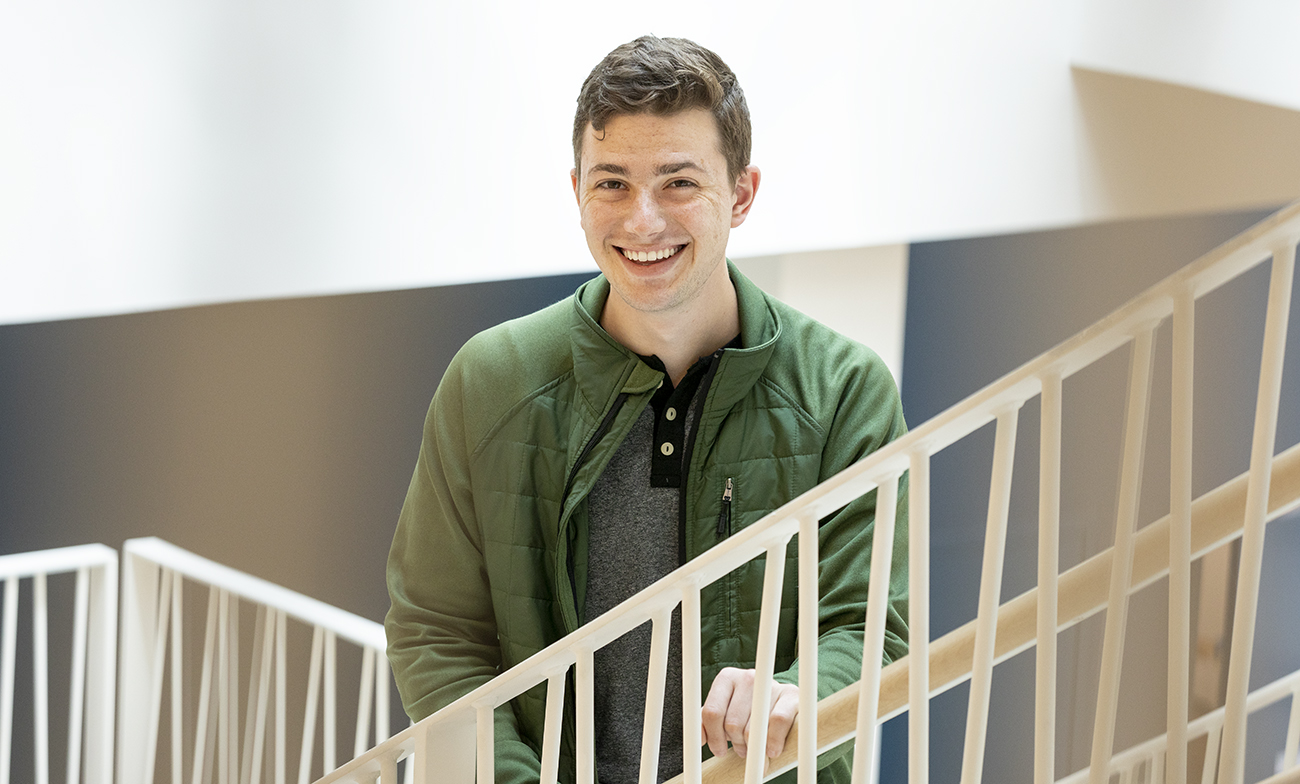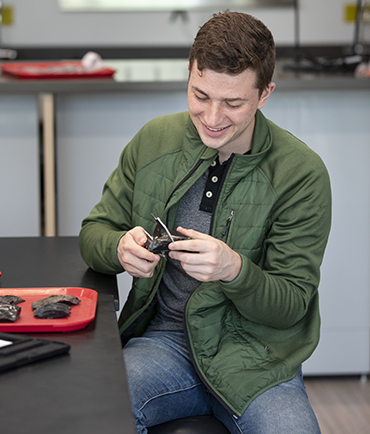Ryan Robinson likes digging dirt. He’ll dig for hours when the dirt holds clues to the past, as it does at Ҫadır Höyük, an archaeological site in central Turkey. Robinson (BA, Near Eastern Languages & Civilization, Anthropology, 2019), who graduated in June, spent two summers excavating at Ҫadır Höyük, uncovering bones and stone tools dating back 4500 years — all because of a conversation during transfer student orientation.
The conversation took place two months before the start of autumn quarter 2016. Robinson, transferring to the UW from Olympic College in Bremerton, told an adviser about his fascination with the ancient world, particularly the ancient Middle East. The adviser suggested he chat with a professor who happened to be just down the hall.

The professor was Stephanie Selover, assistant professor of Near Eastern languages and civilization (NELC) and adjunct assistant professor of anthropology. “I talked to her for a half hour or so,” Robinson recalls. “At the start of our conversation I didn’t know who she was or what I wanted to study. By the end she’d given me her card, signed me up for two of her classes, and convinced me to come with her to Turkey the following summer. I had this idea of professors at a big university being intimidating, but Stephanie was really welcoming.”
His first year at the UW, Robinson took archaeology courses but also Arabic language courses, figuring it made sense to learn the language most widely spoken in the Middle East, his region of interest. “Also, I’ve always heard that if you learn Arabic, it’s a lot easier to learn ancient languages that Arabic sprouted from, like Aramaic or Syriac,” he explains. “Of course then I went to Turkey, where I could use absolutely none of it.”
It’s definitely not for everyone. But it was the most fun I’ve ever had in my life.
Robinson was one of three UW undergraduates who joined Selover for the 2017 excavation in Turkey, working alongside teams from Britain, Italy, Poland, Turkey, and other countries. The site’s name, Ҫadır Höyük, translates to “tent mound” because settlers repeatedly tore down crumbling buildings and built on top of them, creating a hill that holds the remains of 6000 years of human settlement. A walk up the slope is like traveling through time.
Assigned to one of the oldest areas of the site, where the buried material is particularly brittle, Robinson and others painstakingly removed about five centimeters of dirt at a time using a small triangular trowel and broom brush. They looked for bits of pottery, bones, and other artifacts in the soil. “It’s tedious,” Robinson says. “It’s definitely not for everyone. But it was the most fun I’ve ever had in my life. Despite taking archaeology courses, without actually being at a site you can’t envision what it will be.”
Stone tools are a common find at the site. They must be identified and catalogued, a job usually assigned to a stone-tool expert. When the position became vacant during Robinson’s first excavation, Selover vouched for him and he was asked to step in, a prospect that was equal parts flattering and terrifying, particularly since there was only limited internet service at the site and just one textbook for researching the tools.

Robinson recalls sneaking off to the on-site lab after dinner, when everyone else was relaxing, to look at the textbook and take notes. “A couple of times, the director of the lab would come in and be impressed that I was still working. He may have slightly misinterpreted it as me being more enthusiastic than I actually was,” Robinson recalls with a laugh. “Really what I was doing was panicking, because I was the specialist for stone tools and I knew nothing about stone tools. But over time I learned more, and it was a cool thing to have all those tools pass through my hands.”
The next summer, Robinson continued in the role. He returned to Turkey with more knowledge and confidence, having attended a two-week archaeology field school on stone tools in Cyprus that spring. Reviewing a database he had created his first summer — a record of the measurements and function of each excavated tool — he laughed to see how wrong he’d been in some cases. “All the measurements were fine, but I’d look at a tool from the previous summer and think, ‘I really thought this tool was for that?’ It was a bit mortifying. I had to completely redo my work from the previous summer. I was much more prepared the second time.”
Robinson has since used that database for a thesis project in anthropology, which explores how digital technology may offer new perspectives on stone tools. He also completed a thesis for his NELC major, analyzing coins from third century BCE Persia, which he describes as an obscure period in Persian history. He presented his stone tool research at a Harvard conference and his Persian coin research at a New York University conference, and also presented at this year’s UW Undergraduate Research Symposium.
Scholarship support made many of these opportunities possible. Robinson received an Undergraduate Research Travel Award, a Foreign Language and Area Studies Fellowship, and the Irene Dickson MacFarlane Tuition Scholarship during his time at the University. He says that the support has been “such a relief” financially, as well as a welcome indication that he is on the right track. He plans to pursue a doctorate in archaeology, and the awards “give me a lot of optimism going into grad school,” he says.
He’s not going just yet. First Robinson plans to take a year to decompress — and participate in one or more excavations. “I look forward to graduate school,” he says. “But I’ve been in school for a long time, so first I want to be able to live without grades for a little bit.”
More Stories

AI in the Classroom? For Faculty, It's Complicated
Three College of Arts & Sciences professors discuss the impact of AI on their teaching and on student learning. The consensus? It’s complicated.

What Students Really Think about AI
Arts & Sciences weigh in on their own use of AI and what they see as the benefits and drawbacks of AI use in undergraduate education more broadly.

A Love of Classics and Ballroom
Michael Seguin studied Classics at the UW and now owns Baltimore's Mobtown Ballroom. The two interests, he says, are more connected than they might seem.